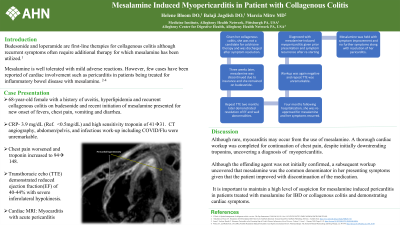Tuesday Poster Session
Category: Colon
P3711 - Mesalamine Induced Myopericarditis in Patient with Collagenous Colitis
Tuesday, October 29, 2024
10:30 AM - 4:00 PM ET
Location: Exhibit Hall E

Has Audio

Helene Bloom, DO
Allegheny Health Network
Pittsburgh, PA
Presenting Author(s)
Helene Bloom, DO1, Balaji Jagdish, DO2, Marcia Mitre, MD3
1Allegheny Health Network, Pittsburgh, PA; 2Allegheny General Hospital, Pittsburgh, PA; 3Allegheny Center for Digestive Health, Pittsburgh, PA
Introduction: While loperamide and budesonide are first-line therapies for collagenous colitis, recurrent symptoms often require additional therapy for which mesalamine has been utilized. Mesalamine is well tolerated with mild adverse reactions. However, few cases have been reported of cardiac involvement such as pericarditis in patients being treated for inflammatory bowel disease. We present a rare case of mesalamine-induced myopericarditis in the setting of collagenous colitis.
Case Description/Methods: A 68-year-old female with a past history of uveitis, hyperlipidemia and collagenous colitis on budesonide and recent initiation of mesalamine presented for new onset of fevers, chest pain, vomiting and diarrhea. In the ED, CRP was 3.9 mg/dL (Ref. < 0.5mg/dL) and elevated high sensitivity troponin of 41 and 31. CTA chest, CT abdomen/pelvis, and infectious work-up including COVID/Flu were unremarkable. Her chest pain worsened and troponin increased to 94 and 148. Transthoracic echocardiogram (TTE) demonstrated reduced ejection fraction(EF) of 40-44% with severe inferolateral hypokinesis. Cardiac MRI demonstrated myocarditis with acute pericarditis. Given her collagenous colitis, she was not a candidate for colchicine and was discharged after symptom resolution.
Three weeks later, mesalamine was discontinued due to insurance and she remained on budesonide. Repeat TTE two months later demonstrated resolution of EF and wall abnormalities. Four months following hospitalization, she was re-approved for mesalamine and her symptoms recurred. Workup was again negative and repeat TTE was unremarkable. Given her prior presentation and symptom recurrence after re-starting mesalamine, she was diagnosed with mesalamine-induced myopericarditis, and mesalamine was held with improvement. Since discontinuation, she has had no additional symptoms and resolution of her myopericarditis.
Discussion: While this patient presented with GI-related infectious symptoms, a thorough cardiac workup was completed for continuance of chest pain, despite initially downtrending troponins, and myopericarditis was discovered. Although the offending agent was not initially confirmed, a subsequent workup uncovered that mesalamine was the common denominator in her presenting symptoms given that the patient improved with discontinuation of the medication. It is important to maintain a high level of suspicion for mesalamine-induced pericarditis in patients treated with mesalamine for IBD or collagenous colitis and demonstrating cardiac symptoms.
Disclosures:
Helene Bloom, DO1, Balaji Jagdish, DO2, Marcia Mitre, MD3. P3711 - Mesalamine Induced Myopericarditis in Patient with Collagenous Colitis, ACG 2024 Annual Scientific Meeting Abstracts. Philadelphia, PA: American College of Gastroenterology.
1Allegheny Health Network, Pittsburgh, PA; 2Allegheny General Hospital, Pittsburgh, PA; 3Allegheny Center for Digestive Health, Pittsburgh, PA
Introduction: While loperamide and budesonide are first-line therapies for collagenous colitis, recurrent symptoms often require additional therapy for which mesalamine has been utilized. Mesalamine is well tolerated with mild adverse reactions. However, few cases have been reported of cardiac involvement such as pericarditis in patients being treated for inflammatory bowel disease. We present a rare case of mesalamine-induced myopericarditis in the setting of collagenous colitis.
Case Description/Methods: A 68-year-old female with a past history of uveitis, hyperlipidemia and collagenous colitis on budesonide and recent initiation of mesalamine presented for new onset of fevers, chest pain, vomiting and diarrhea. In the ED, CRP was 3.9 mg/dL (Ref. < 0.5mg/dL) and elevated high sensitivity troponin of 41 and 31. CTA chest, CT abdomen/pelvis, and infectious work-up including COVID/Flu were unremarkable. Her chest pain worsened and troponin increased to 94 and 148. Transthoracic echocardiogram (TTE) demonstrated reduced ejection fraction(EF) of 40-44% with severe inferolateral hypokinesis. Cardiac MRI demonstrated myocarditis with acute pericarditis. Given her collagenous colitis, she was not a candidate for colchicine and was discharged after symptom resolution.
Three weeks later, mesalamine was discontinued due to insurance and she remained on budesonide. Repeat TTE two months later demonstrated resolution of EF and wall abnormalities. Four months following hospitalization, she was re-approved for mesalamine and her symptoms recurred. Workup was again negative and repeat TTE was unremarkable. Given her prior presentation and symptom recurrence after re-starting mesalamine, she was diagnosed with mesalamine-induced myopericarditis, and mesalamine was held with improvement. Since discontinuation, she has had no additional symptoms and resolution of her myopericarditis.
Discussion: While this patient presented with GI-related infectious symptoms, a thorough cardiac workup was completed for continuance of chest pain, despite initially downtrending troponins, and myopericarditis was discovered. Although the offending agent was not initially confirmed, a subsequent workup uncovered that mesalamine was the common denominator in her presenting symptoms given that the patient improved with discontinuation of the medication. It is important to maintain a high level of suspicion for mesalamine-induced pericarditis in patients treated with mesalamine for IBD or collagenous colitis and demonstrating cardiac symptoms.
Disclosures:
Helene Bloom indicated no relevant financial relationships.
Balaji Jagdish indicated no relevant financial relationships.
Marcia Mitre indicated no relevant financial relationships.
Helene Bloom, DO1, Balaji Jagdish, DO2, Marcia Mitre, MD3. P3711 - Mesalamine Induced Myopericarditis in Patient with Collagenous Colitis, ACG 2024 Annual Scientific Meeting Abstracts. Philadelphia, PA: American College of Gastroenterology.
